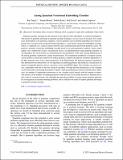Analog Quantum Variational Embedding Classifier
Author(s)
Yang, Rui; Bosch, Samuel; Kiani, Bobak; Lloyd, Seth; Lupascu, Adrian
DownloadPhysRevApplied.19.054023.pdf (10.21Mb)
Publisher Policy
Publisher Policy
Article is made available in accordance with the publisher's policy and may be subject to US copyright law. Please refer to the publisher's site for terms of use.
Terms of use
Metadata
Show full item recordAbstract
Quantum machine learning has the potential to provide powerful algorithms for artificial intelligence. The pursuit of quantum advantage in quantum machine learning is an active area of research. For current noisy intermediate-scale quantum computers, various quantum-classical hybrid algorithms have been proposed. One such previously proposed hybrid algorithm is a gate-based variational embedding classifier, which is composed of a classical neural network and a parameterized gate-based quantum circuit. We propose a quantum variational embedding classifier based on an analog quantum computer, where control signals vary continuously in time: our particular focus is an implementation using quantum annealers. In our algorithm, the classical data are transformed into the parameters of the time-varying Hamiltonian of the analog quantum computer by a linear transformation. The nonlinearity needed for a nonlinear classification problem is purely provided by the analog quantum computer through the nonlinear dependence of the final quantum state on the control parameters of the Hamiltonian. We perform numerical simulations that demonstrate the effectiveness of our algorithm for performing binary and multiclass classification on linearly inseparable datasets such as concentric circles and MNIST digits. Our classifier can reach accuracy comparable with that of the best classical classifiers. We find that the performance of our classifier can be increased by increasing the number of qubits, until the performance saturates and fluctuates. Moreover, the number of optimization parameters of our classifier scales linearly with the number of qubits. The increase of the number of training parameters when the size of our model increases is therefore not as fast as that of a neural network. Our algorithm presents the possibility of using current quantum annealers for solving practical machine-learning problems, and it could also be useful to explore quantum advantage in quantum machine learning.
Date issued
2023-05-05Department
Massachusetts Institute of Technology. Department of Mechanical EngineeringJournal
Physical Review Applied
Publisher
American Physical Society
Citation
Yang, Rui, Bosch, Samuel, Kiani, Bobak, Lloyd, Seth and Lupascu, Adrian. 2023. "Analog Quantum Variational Embedding Classifier." Physical Review Applied, 19 (5).
Version: Final published version
ISSN
2331-7019
Keywords
General Physics and Astronomy